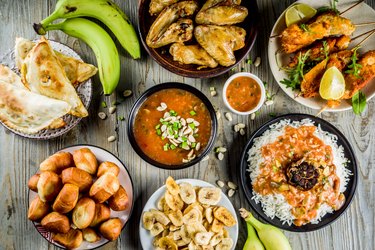
Plenty of different cuisines around the world are naturally far more healthy than the average American diet. A focus on whole foods, rather than processed foods, is key. Here's how eating a low calorie Nigerian diet can actually help you lose weight.
Tip
Traditional Nigerian foods and stews are naturally high in vegetables, beans, meat and fish. To start your seven-day diet plan to lose weight, stay away from processed foods and focus on whole foods. Choose healthy Nigerian options like egusi soup and avoid the higher-calorie dishes like akara, which is deep fried beans.
Video of the Day
Traditional Nigerian Diet
Like many diets around the world, the African diet is heavily based on fresh, whole foods like fruits and leafy vegetables, beans, meat and fish. With greens like collards and spinach making up the base of the diet, paired with vegetables like steamed okra, cabbage, eggplant and green beans, the Nigerian diet is high in fiber and includes the perfect ingredients for a weight loss meal plan.
Video of the Day
In addition to fresh fruits and vegetables, many traditional African dishes are made with delicious mashes of sweet potatoes, yams, beans and onions, as well as hearty sauces. Fish is eaten frequently as a source of protein. Whole grains, meat and dairy, however, are eaten much less and in moderation, sometimes only weekly.
The traditional African diet is quite different from the American diet, which is often high in fats, processed meats and cheese. The Nigerian diet, however, is high in fiber, which may help you lose weight. A study that was published in the February 2015 issue of the Annals of Internal Medicine found that eating a diet high in fiber may assist in weight loss.
To start planning out your weight loss meal plan based on traditional Nigerian or other African foods, first remember to lay the foundation by choosing leafy greens, vegetables, fruit, whole grains, legumes and fish as your base. You can build some interesting dishes from these ingredients.
Read more: 28 Day Mediterranean Diet Plan
Low-Calorie Nigerian Meals
You can get creative and try new tastes and spices when cooking specific, low calorie Nigerian meals that allow your weight loss meal plan to be exciting and delicious rather than boring and bland. Equipped with your basic foundation of choosing whole foods that focus on fruits and vegetables in your diet, you can create a variety of healthy dishes for your weight loss plan.
For example, a Nigerian favorite is egusi soup — made from dried, ground-up seeds from squashes, melons and gourds. These seeds are rich in fat and protein and make for a thick stew. If you can't find these in a grocery store, however, you can substitute pumpkin seeds. Egusi soup will also typically contain green leafy vegetables like pumpkin leaf and spinach, as well as tomatoes, okra, chili peppers, onions, beans and some type of fish or meat.
There are a good number of vegetable and bean-based Nigerian stews like egusi you can experiment with that will fill you up with healthy foods. For protein, cook up some suya or spicy grilled kebab.
Another common Nigerian staple is yams, not to be confused with sweet potatoes, which have yellow or orange flesh and originate in South America. Yams have white or purple flesh, and are naturally found in Asia and Africa. Yams are often eaten in different forms as a complement to Nigerian soups and dishes. While yams are mostly a source of carbohydrates, they also contain a good amount of fiber, vitamin C and potassium.
Read more: Can Sweet Potatoes Help Lower Cholesterol?
Avoid the Higher-Calorie Foods
Some of the ingredients commonly used in staple Nigerian dishes are high in calories and saturated fat. To be successful in your low calorie Nigerian diet, you'll have to know the calorie and nutrition count of some of the staple ingredients.
Palm oil, for example, is often used in Nigerian dishes and it contains high levels of saturated fat. Consuming it in moderation is key, however. A study featured in the March 2015 issue of the World Journal of Cardiology found that eating palm oil as part of an overall healthy, balanced diet didn't actually increase the risk for cardiovascular disease. Palm oil also contains a good amount of antioxidants.
Eat some of the other high caloric foods in moderation as well. The Nigerian diet contains plenty of plantains, for example. Plantains are similar to potatoes in calories, but are more nutritionally rich. According to the United States Department of Agriculture National Nutrient Database, yellow plantains contain magnesium, potassium, vitamin C and vitamin K, among other nutrients.
While you may not want to eat them with every dish due to their high calorie level, you could enjoy them mixed with a Nigerian pottage made of beans and yams. Eating these Nigerian dishes, with the higher calorie or fatty foods in moderation, can help jump-start your weight loss plan.
- Nature Communications: "Fat, Fibre and Cancer Risk in African Americans and Rural Africans"
- Nutrients: "Diosgenin-Rich Yam Extract Enhances Cognitive Function: A Placebo-Controlled, Randomized, Double-Blind, Crossover Study of Healthy Adults"
- World Journal of Cardiology: "Palm Oil and the Heart: A Review"
- USDA National Nutrient Database: "Basic Report: 09277, Plantains, Yellow, Raw"
- National Academies Press: "Lost Crops of Africa: Volume II: Vegetables: Egusi"
- Harvard Health Publishing: "Vegetable of the Month: Sweet Potatoes"